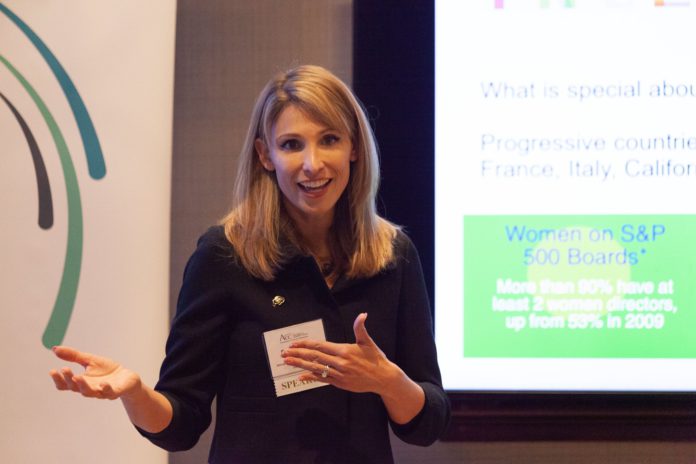
On Thursday night at The Palm restaurant in Denver, there were no men in the room at a legal networking event.
Lawyers at firms and corporate legal departments came for speeches and a panel about increasing women on boards. The Association of Corporate Counsel and Stinson hosted the event.
Stefanie Johnson, an associate professor of management at the University of Colorado Leeds School of Business, spoke first. Jo Lynne Whiting and Barbara Bauer, who are on the board of a Colorado organization focused on getting more women on opening up the board pipeline. The speakers said to think about increasing diversity on corporate boards as good for business.
Johnson studies how unconscious bias influences evaluation of leaders and strategies leaders can use to reduce bias. Johnson said research, including her own, has shown having women on boards has tangible benefits: A company better capturing its target market, better returns on investment and improving decision making on the board. “Boards are really there to protect all of our stakeholders,” Johnson said. “And so when you think about the benefit of having women on boards for things like bottom-line stock prices, how can it be in stockholders’ or stakeholders’ best interest not to have women on boards?”
She said right now 90% of S&P 500 companies have at least two women directors, with 10 a common number of board members.
Johnson discussed research she has done surveying board members who sit on more than one. She said they tended to say gender diversity on boards improves consensus building, improves diversity in other ways and makes the boards more likely to care about social responsibility. She interviewed Marge Magner, who has sat on the boards of Tegna, Accenture and Ally Financial, which each have 40% women board members.
“She said it’s not an accident when there are boards that have diversity. Work has been done to accomplish that,” Johnson said. “Those who achieve it have made a commitment, and they reap the benefits of it.” She said getting rid of the “C-suite” standard – having a company executive leadership position – for getting on corporate boards could help open up the pipeline for more gender diversity, because men tend to fill those positions.

“So if you make that a criteria for board members, you’re just making sure that you continue to have all male board members,” Johnson said. “You don’t need 10 people with the same exact background, because then you’re not actually getting new information.”
Boardbound by Women Leadership Foundation, which Whiting chairs and Bauer also sits on the board of, has programs intended to increase the number of women on both corporate and nonprofit boards. Boardconnect introduces search teams and firms to women board candidates that Boardbound knows through its board readiness training programs or other ways, and it’s intended as a way for companies to look outside their established networks to increase board diversity.

After the main speakers finished, a few women who sit on boards talked about their career paths and advice for others who may want board careers someday. Meg Porfido is on the board of Kaiser Permanente and has also served as a director of Rally Software. Cindy Bedard is the chief financial officer at DEFY, a CBD performance drink company, and a director of SVN International Corporation.
Some of their pointers: A variety of experiences can be relevant for serving on a board, so know how to sell your experience. Networking and relationships matter. Say yes to opportunities that could open more doors, even if they don’t sound like your first choice.
Stay invested in whatever work you’re doing.
“Don’t just check a box. Show up,” Porfido said. “If you’re going to put the time in to say you’re going to be on this board, show up. Be the person that they remember was on that board.”
—Julia Cardi

